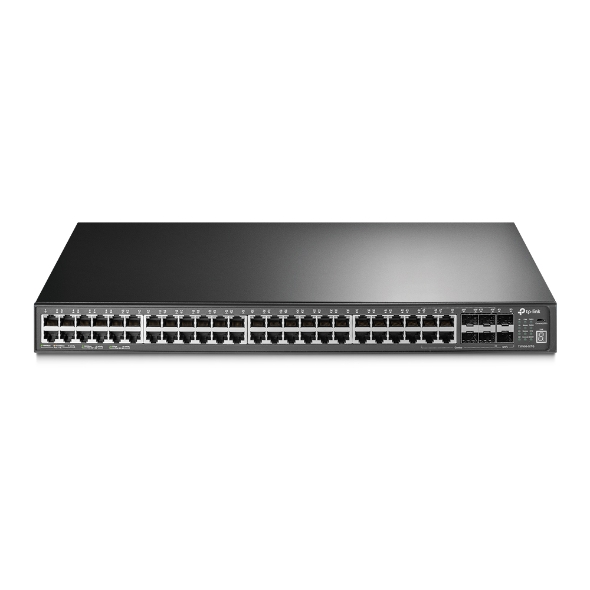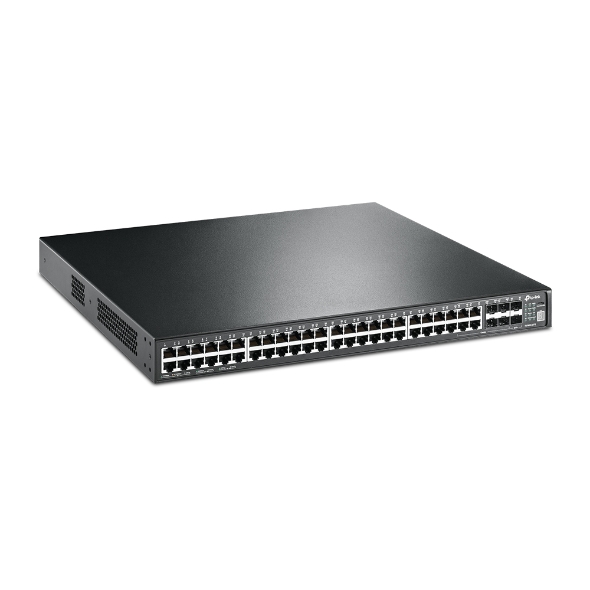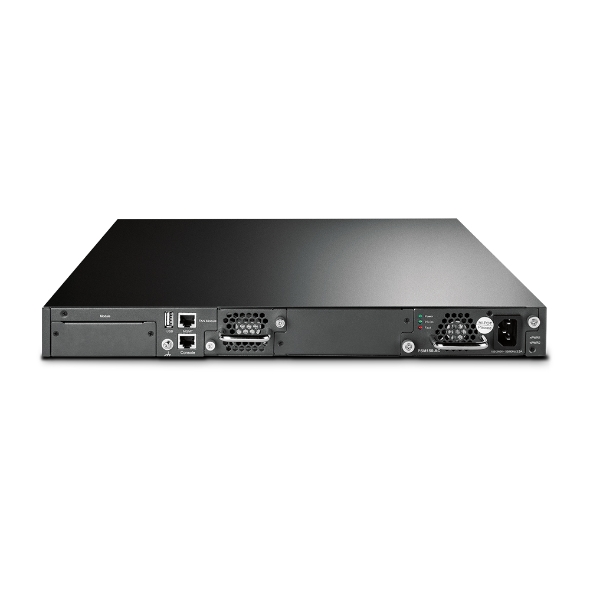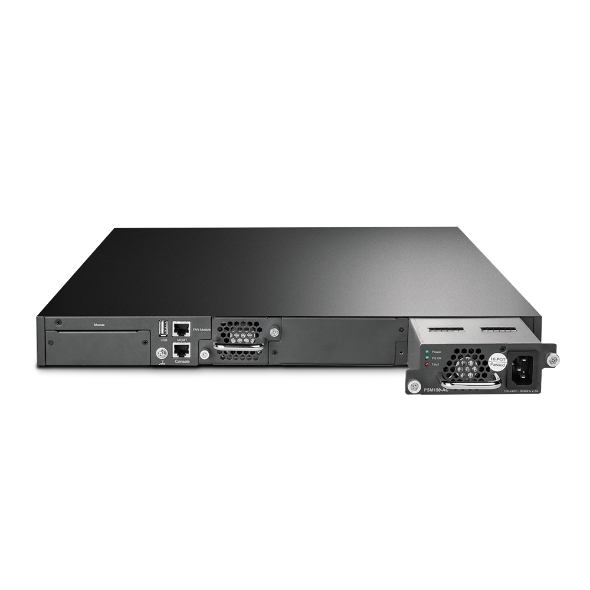T3700G-52TQ
End of LifeJetStream 52-Port Gigabit Stackable L3 Managed Switch
- Abundant Layer 3 routing protocols including RIP/OSPF/ECMP/VRRP that support a scalable network
-
True Physical Stacking technology supports up to 8 units for high scalability and efficient redundancy
-
10 Gigabit Ethernet uplink provides high-bandwidth applications for congestion relief and smooth data delivery
-
Dual removable power units minimize downtime
-
PIM-SM/PIM-DM/IGMP Snooping for resilient video deployments
-
RJ45/Micro-USB Console ports and out-of-band Management port provide a range of management options
-
A USB 2.0 port makes it easy to import files and restore configurations
Overview
TP-Link’s JetStream T3700 series L3 managed switches are designed to form highly accessible, scalable and robust networks. With an extensive suite of routing protocols, 10Gbps wired speeds, physical stacking technology, diverse management features and an optional redundant external power unit, TP-Link’s JetStream T3700 series provide a reliable, secure and cost-effective solution for enterprise, campus and ISP networks.
Advanced L3 Features
T3700 series switches support Layer 3 routing protocols that include Static Routing, RIP, OSPF and VRRP, helping to build scalable, reliable networks. Multicast routing protocols such as PIM-SM and PIM-DM guarantee efficient routing for multicast groups.
Physical Stacking Technology
The switches are equipped with 2 fixed and 2 optional 10G SFP+ ports which can be used for stacking. T3700G-52TQ supports up to 8 switches for network simplification, and up to 384 GE, 32 Gigabit combo SFP and 32 10G SFP+ ports per physical stack, providing up to 1408Gbps total switching capacity for the network. With all units identified by a simple IP address, the stack can be easily configured and monitored.
Rich Out-of-band management port
T3700 series switches provide 3 kinds of out-of-band management ports: RJ45 console ports, Micro-USB console ports and RJ45 out-of-band management ports. Micro-USB console ports are designed for those laptop computers which do not support the RS232 (DB9) interface. Customers can use a USB cable to manage switches through the CLI (command-line interface). The RJ45 out-of-band management port is used solely for web management, leaving the RJ45 ports free for data transmission.
Related Cases
-
East European Comic Con
TP-Link Provides Internet Access for East European Comic Con for the Fourth Year Running
East European Comic Con
TP-Link Provides Internet Access for East European Comic Con for the Fourth Year Running
“TP-Link Romania have provided a high-quality service and the right equipment to meet our requirements in each of the projects we have worked on together. EECC2017 was their toughest challenge so far and they passed with flying colors.” —Marius Radu, EECC Gaming Director -
TV Skyline
Omada Offers TV Skyline Reliable Data Transfers and Failure Safety for Live Broadcasting
TV Skyline
Omada Offers TV Skyline Reliable Data Transfers and Failure Safety for Live Broadcasting
“TP-Link gave excellent technical support regarding the configuration of V-LANs and LACP, i.e. cable bundling. It is especially great that we have a personal contact person for all questions regarding the technology.” —Laurent Schiltz, technical manager at TV Skyline -
ISP Citynet
Omada Offers Citynet Reliable and High-Speed Data Transfer for Network Service
ISP Citynet
Omada Offers Citynet Reliable and High-Speed Data Transfer for Network Service
“I would like to emphasize that of the large number of devices deployed, not one of them has suffered any type of physical failure. There was a point at which the price of TP-Link’s Jetstream series was something we no longer considered important since they’re so reliable. We stopped looking at other manufacturers because we were so satisfied with the products we purchased.” —Skynet
| HARDWARE FEATURES | |
|---|---|
| Standards and Protocols | IEEE 802.3i, IEEE 802.3u, IEEE 802.3ab, IEEE802.3z, IEEE 802.3ae, IEEE 802.3ad, IEEE 802.3az, IEEE 802.3x, IEEE 802.1d, IEEE 802.1s, IEEE 802.1w, IEEE 802.1q, IEEE 802.1x, IEEE 802.1p |
| Interface | 48 10/100/1000Mbps RJ45 Ports (Auto Negotiation/Auto MDI/MDIX)4 Combo Gigabit SFP SlotsUp to 4 10G SFP+ Slots (2 fixed and 2 optional)1 Micro-USB, 1 RJ45 Console Port1 Management Port1 USB Slot |
| Network Media | 10BASE-T: UTP category 3, 4, 5 cable (maximum 100m)100BASE-TX/1000Base-T: UTP category 5, 5e or above cable (maximum 100m)100BASE-FX: MMF, SMF1000BASE-X: MMF, SMF10GBASE-LR10GBASE-SR |
| Fan Quantity | 2 Removable |
| Physical Security Lock | No |
| Power Supply | 100~240VAC, 50/60HzDual Hot-swappable power supply module: PSM150 (Maximum Output Power: 150W) |
| Dimensions ( W x D x H ) | 17.32*16.55*1.73 in. (440*420*44 mm) |
| Mounting | Rack Mountable |
| Max. Power Consumption | 58.82W (220V/50Hz) |
| Max Heat Dissipation | 200.69 BTU/h |
| PHYSICAL STACKING | |
|---|---|
| Installable SFP+ Transceivers and Direct Attach Copper (DAC) Cables | TXM431-SRTXM431-LRTXC432-CU1MTXC432-CU3M |
| Max Number of Stacking Ports Installable | 2 SFP+ |
| Stacking Speed (Per Port) | 20 Gbps (Full-Duplex) |
| No. of Units Per Stack | 8 |
| PERFORMANCE | |
|---|---|
| Switching Capacity | Up to 176Gbps for a standalone switch |
| Packet Forwarding Rate | Up to 130.9Mpps for a standalone switch |
| MAC Address Table | 32K |
| Packet Buffer Memory | 4MB |
| Jumbo Frame | 12KB |
| Number of Routes | 8K IPv4 |
| Number of Static Routes | 256 IPv4 |
| Number of IP Interfaces | 128 IPv4 |
| SOFTWARE FEATURES | |
|---|---|
| Quality of Service | Support 802.1p CoS/DSCP prioritySupport 8 priority queuesQueue scheduling: SP, WRR, SP+WRRIngress/Egress DiffServPort/Flow- based Rate LimitingVoice VLAN |
| L3 Features | Wire-speed IP forwardingStatic RoutingRIP v1, v2OSPF v2ECMPPIM-SM/PIM-DM/IGMPDHCP Server/RelayARP ProxyVRRP |
| L2 Features | IGMP Snooping V1/V2/V3MVR802.3ad LACP (Up to 64 aggregation groups, 8 ports per group)Spanning Tree STP/RSTP/MSTPBPDU Filtering/GuardTC/Root ProtectLoop back detection802.3x Flow Control |
| VLAN | Supports up to 4K VLANs simultaneously IEEE 802.1Q VLAN/MAC VLAN/Protocol VLAN/QinQ/Private VLAN/GVRP |
| Security | IP-MAC-Port-VID BindingIEEE 802.1XAAARadius/Tacacs+ Authentication and AccountingDoS DefenceDynamic ARP inspection (DAI)IP Source GuardSSH v1/v2SSL v2/v3/TLSv1Port SecurityAccess Control listBroadcast/Multicast/Unknown-unicast Storm Control |
| Management Features | Web-based GUI and CLI managementSNMP v1/v2c/v3,compatible with public MIBs and TP-LINK private MIBsRMON (1, 2, 3, 9 groups)DHCP/BOOTP Client, DHCP Snooping, DHCP Option82CPU MonitoringPort MirroringTime Setting: SNTPFirmware Upgrade: TFTP & WebSYSLOG & Public MIBSDual ImageIPv6 Management |
| OTHERS | |
|---|---|
| Certification | CE, FCC, RoHS |
| Package Content | Switch; Power Cord; Quick Installation Guide; Resource CD; Rackmount Kit; Rubber Feet |
| System Requirements | Microsoft® Windows® 98SE, NT, 2000, XP, Vista™ or Windows 7/8, MAC® OS, NetWare®, UNIX® or Linux. |
| Environment | Operating Temperature: 0℃~40℃ (32℉~104℉)Storage Temperature: -40℃~70℃ (-40℉~158℉)Operating Humidity: 10%~90% non-condensingStorage Humidity: 5%~90% non-condensing |















